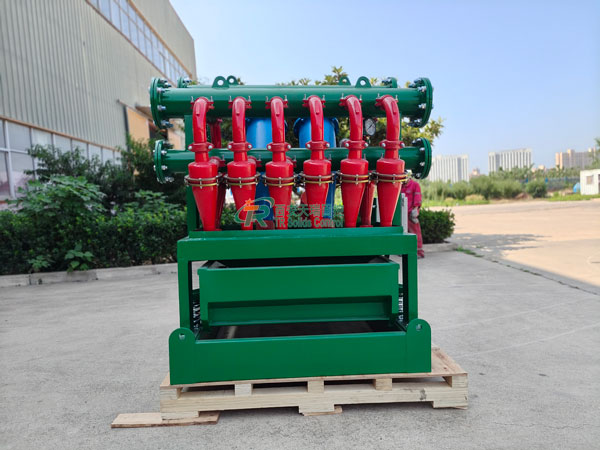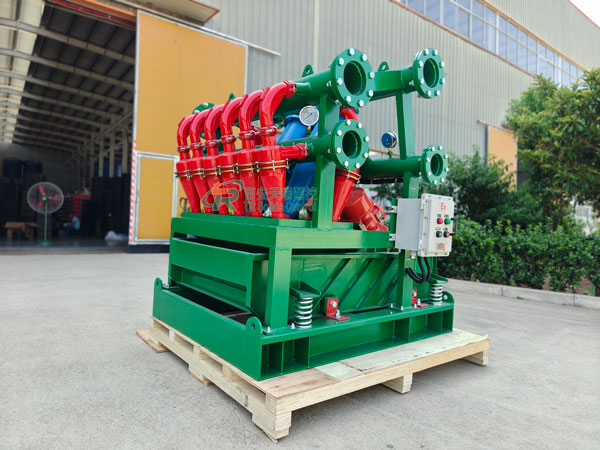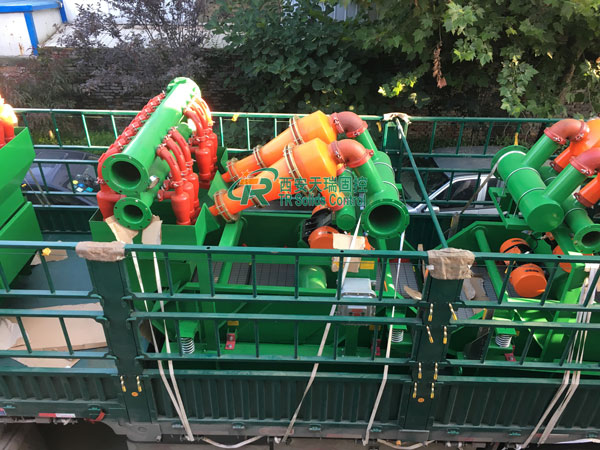The mud cleaner (also known as a desander and desilter) is the core component of a drilling mud solids control system. It integrates a drilling fluid Shale shaker, desander, and desilter, efficiently separating sand and mud particles sized 20-74μm from drilling fluid. Leveraging the integrated purification capabilities of a hydrocyclone and high-frequency fine screen, it boasts a wide range of applications and significant advantages.

The mud cleaner integrates the functions of sand screening, cone sand removal and cone mud removal, and is mainly used to remove sand and mud solid phases in drilling fluid.
The mud cleaner integrates multiple key components, including a desanding assembly, a desilting assembly, an underflow collection chamber, an inlet and overflow manifold, and a vibrating screen for cleaning drilling fluid. Its flexible operating principle allows for various combinations, such as desanding + cleaning screen or desilting + cleaning screen, to meet diverse drilling process requirements.
Oil and Gas Drilling
As a secondary and tertiary solids control device, the new mud cleaner is used for deep purification of drilling fluid after vibrating screens. It removes residual sand (44-74μm) and mud (20-44μm) solids from the circulating drilling fluid, ensuring stable drilling fluid performance and extending the service life of the drill bit and drilling tools.
Coalbed Methane Development and Mining Engineering
In geological exploration projects such as coalfields, nonferrous metals, mining, and nuclear industries, this equipment can adapt to complex formation conditions, effectively separate solid particles from drilling fluids, reduce equipment wear, and improve operational efficiency.
Trenchless directional drilling and piling projects
Through its modular design, the equipment can be quickly deployed in construction environments with limited space, such as urban underground pipeline laying or bridge piling, enabling slurry recycling and reducing waste emissions.
Waste Mud Treatment
As a pre-processing device for centrifuges, the new mud cleaner can pre-separate large solid particles from drilling fluid, preparing for subsequent centrifugal separation and reducing treatment costs.

Compact Structure, Space-Saving
The equipment utilizes an integrated design, combining sand removal, mud removal, and vibrating screening functions into one unit. It occupies 30%-50% less floor space than traditional equipment, making it suitable for space-constrained applications such as drilling platforms and tunnel construction.
Efficient solid-liquid separation improves mud quality
Desanding Cyclones: Equipped with 1-3 10" or 12" cyclones, they can separate particles between 45-74μm and have a processing capacity of 120-360 cubic meters per hour.
Desilting Cyclones: Integrated with 8-20 4" or 5" cyclones, they can separate particles between 15-44μm, ensuring the solids content in the mud is less than 4%.
Vibrating Screens: Utilizing Martin or Oli brand vibrating motors, the screens can be tensioned with hooked or wedge-shaped blocks, providing a large filtration area, high slag dryness, and easy transportation.
Modular design provides flexible operation.
The cyclone is available in polyurethane, ceramic-lined, or rubber materials for wear and corrosion resistance.
A control butterfly valve is installed between the main inlet and outlet pipes to adjust the number of desander/desilter units operating to meet the needs of different formations.
The screen box angle can be manually adjusted to optimize slag removal efficiency.
Improved Automation and Reliability
The cyclone is equipped with an automatic sand blocking prevention device and an underflow outlet adjustment device, reducing manual intervention.
The screen box undergoes heat treatment, a surface sandblasting treatment, and a coating of highly corrosion-resistant marine paint to extend its service life.
Electrical components from Schneider or Siemens brands ensure system stability.
Economical and Environmentally Friendly
High-efficiency separation reduces drilling fluid waste and lowers material costs.
The separated slag can be recycled (for example, for use in ground-anchored wall plugging), reducing waste emissions and meeting environmental standards.
Capacity: Select a model with a capacity of 120-360 cubic meters per hour based on the drilling scale.
Cyclone Configuration: Desanders can be configured with 1-3 10-inch cyclones, while desilters can be configured with 8-20 4-inch cyclones.
Screen Aperture: 0.15-0.2mm is recommended to balance filtration efficiency and discharge dryness.
Motor Brand: Preferred are well-known brands such as Martin and Oli to ensure vibration strength and stability.

Xi'an TR Solids Control's mud cleaners, incorporating advanced technologies from both China and abroad, have been meticulously designed and repeatedly upgraded. Their superior quality and proven technology have earned them the favor of numerous domestic and international customers. They are particularly well-suited for desanding and desilting in slurries, making them an ideal, efficient, and practical choice.

Address: No.2 Hu·ochang Rood, Yangling District, Xianyang City, Shaanxi Province, China
Tel: +86-13186019379
Email: sales@trsolidscontrol.com
Contact: Mr.Li